Abstract
The quality of physician-patient communication affects important health care outcomes. Managed care presents a number of challenges to physician-patient communication, including shorter visits, decreased continuity, and lower levels of trust. Good communication skills can help physicians create and maintain healthy relationships with patients in the face of these challenges. We describe 5 communication dilemmas that are common in managed care and review possible solutions suggested by recent literature on physician-patient communication. We also describe ways that managed care plans can promote more effective communication between physicians and patients.
Full text
PDF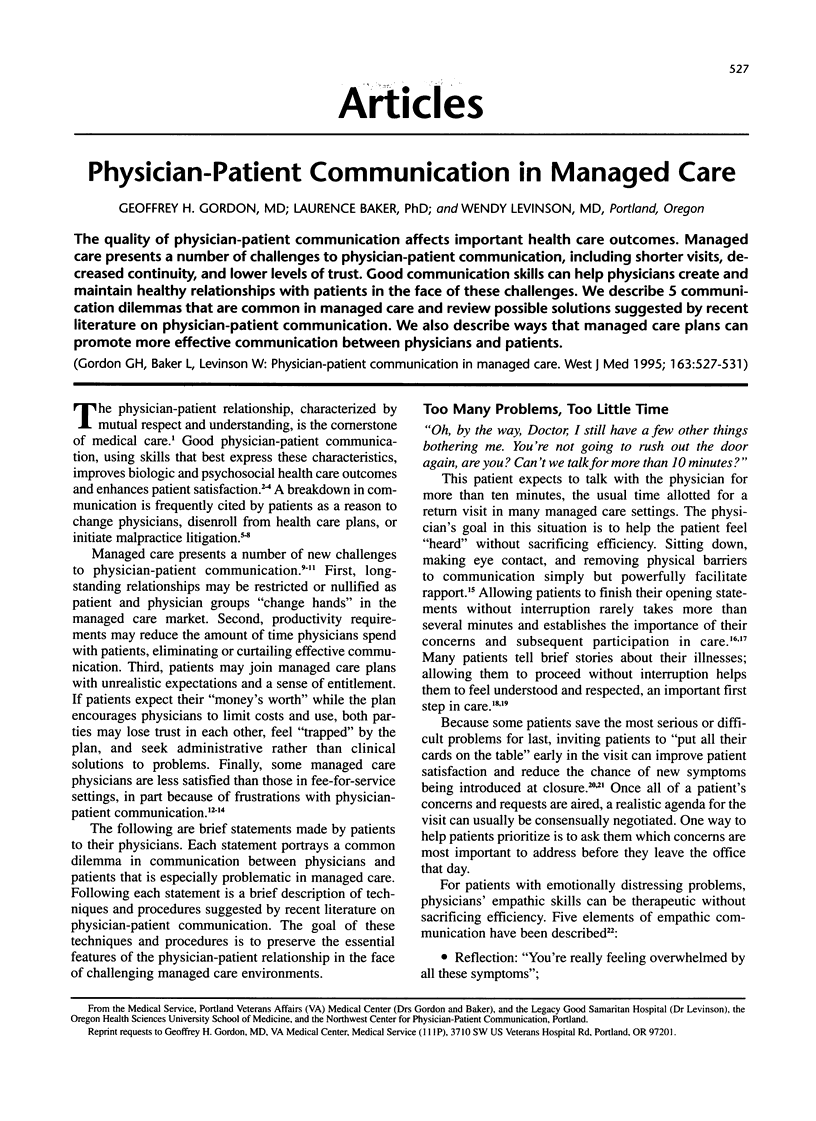
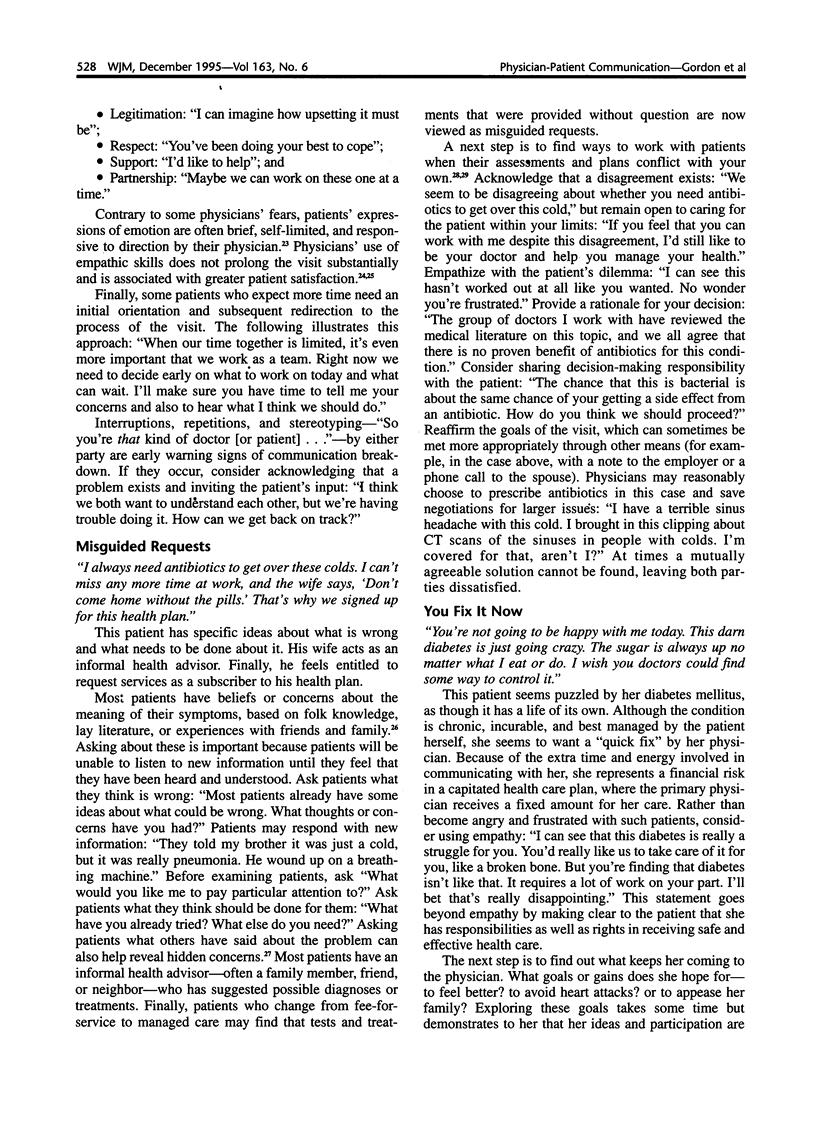
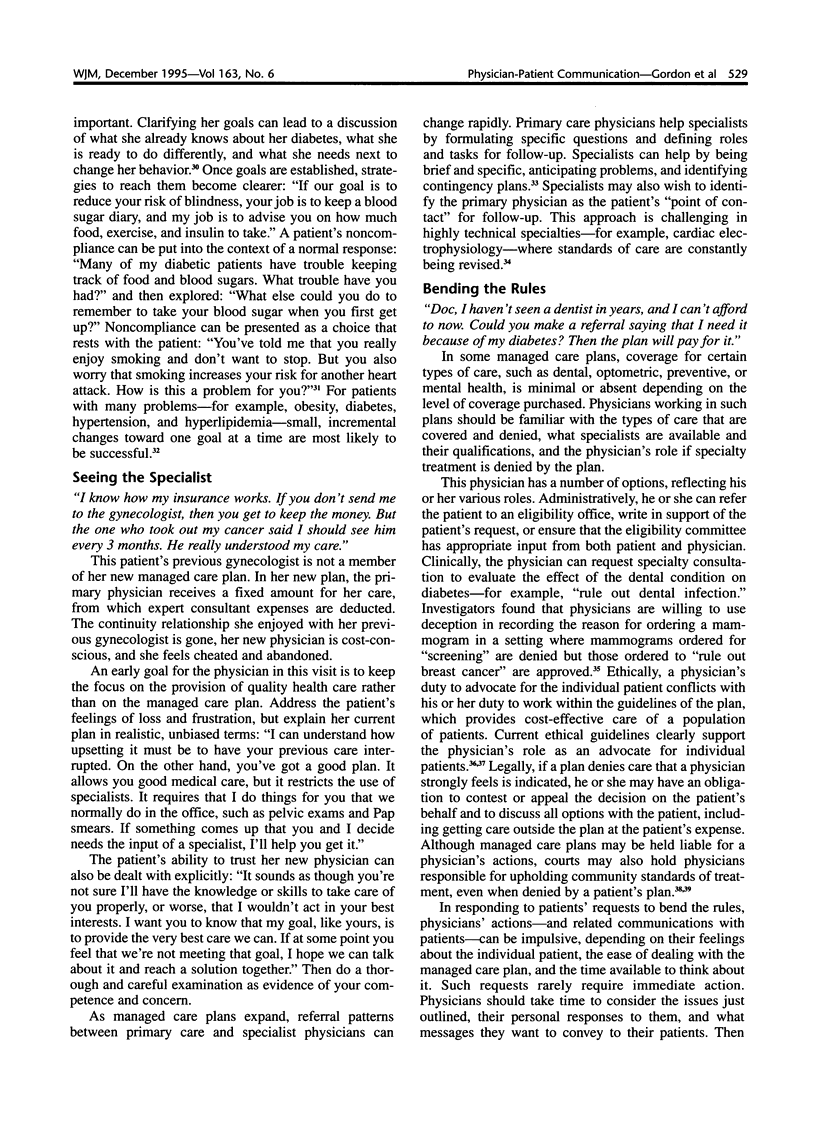
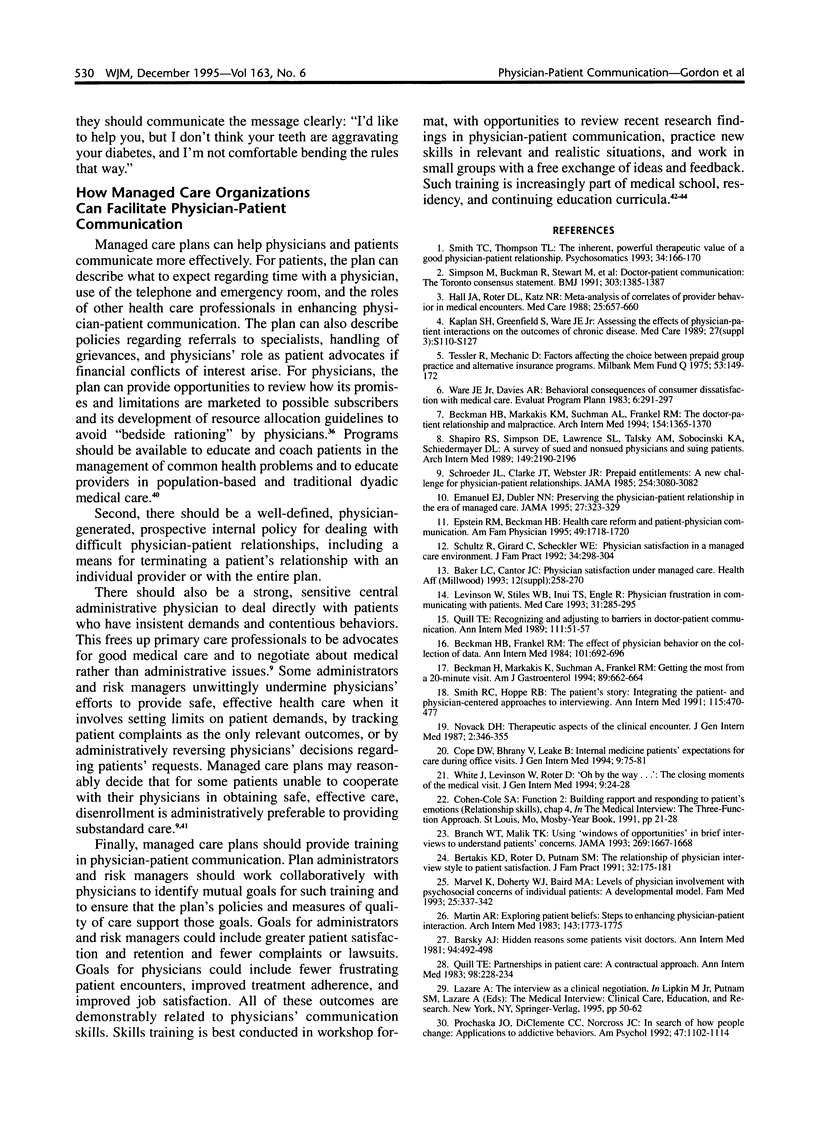
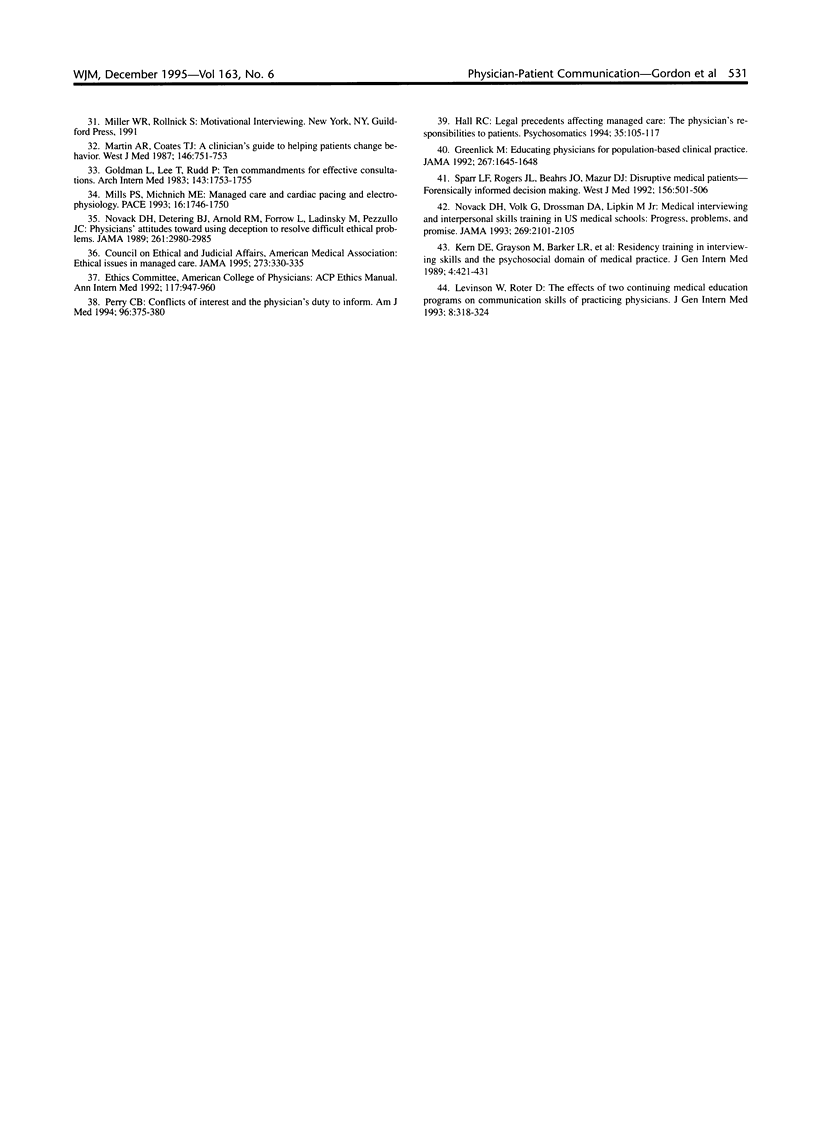
Selected References
These references are in PubMed. This may not be the complete list of references from this article.
- Baker L. C., Cantor J. C. Physician satisfaction under managed care. Health Aff (Millwood) 1993;12 (Suppl):258–270. doi: 10.1377/hlthaff.12.suppl_1.258. [DOI] [PubMed] [Google Scholar]
- Barsky A. J., 3rd Hidden reasons some patients visit doctors. Ann Intern Med. 1981 Apr;94(4 Pt 1):492–498. doi: 10.7326/0003-4819-94-4-492. [DOI] [PubMed] [Google Scholar]
- Beckman H. B., Frankel R. M. The effect of physician behavior on the collection of data. Ann Intern Med. 1984 Nov;101(5):692–696. doi: 10.7326/0003-4819-101-5-692. [DOI] [PubMed] [Google Scholar]
- Beckman H. B., Markakis K. M., Suchman A. L., Frankel R. M. The doctor-patient relationship and malpractice. Lessons from plaintiff depositions. Arch Intern Med. 1994 Jun 27;154(12):1365–1370. [PubMed] [Google Scholar]
- Beckman H., Markakis K., Suchman A., Frankel R. Getting the most from a 20-minute visit. Am J Gastroenterol. 1994 May;89(5):662–664. [PubMed] [Google Scholar]
- Bertakis K. D., Roter D., Putnam S. M. The relationship of physician medical interview style to patient satisfaction. J Fam Pract. 1991 Feb;32(2):175–181. [PubMed] [Google Scholar]
- Branch W. T., Malik T. K. Using 'windows of opportunities' in brief interviews to understand patients' concerns. JAMA. 1993 Apr 7;269(13):1667–1668. [PubMed] [Google Scholar]
- Emanuel E. J., Dubler N. N. Preserving the physician-patient relationship in the era of managed care. JAMA. 1995 Jan 25;273(4):323–329. [PubMed] [Google Scholar]
- Epstein R. M., Beckman H. B. Health care reform and patient-physician communication. Am Fam Physician. 1994 Jun;49(8):1718–1720. [PubMed] [Google Scholar]
- Goldman L., Lee T., Rudd P. Ten commandments for effective consultations. Arch Intern Med. 1983 Sep;143(9):1753–1755. [PubMed] [Google Scholar]
- Greenlick M. R. Educating physicians for population-based clinical practice. JAMA. 1992 Mar 25;267(12):1645–1648. [PubMed] [Google Scholar]
- Hall J. A., Roter D. L., Katz N. R. Meta-analysis of correlates of provider behavior in medical encounters. Med Care. 1988 Jul;26(7):657–675. doi: 10.1097/00005650-198807000-00002. [DOI] [PubMed] [Google Scholar]
- Hall R. C. Legal precedents affecting managed care. The physician's responsibilities to patients. Psychosomatics. 1994 Mar-Apr;35(2):105–117. doi: 10.1016/S0033-3182(94)71783-7. [DOI] [PubMed] [Google Scholar]
- Kaplan S. H., Greenfield S., Ware J. E., Jr Assessing the effects of physician-patient interactions on the outcomes of chronic disease. Med Care. 1989 Mar;27(3 Suppl):S110–S127. doi: 10.1097/00005650-198903001-00010. [DOI] [PubMed] [Google Scholar]
- Kern D. E., Grayson M., Barker L. R., Roca R. P., Cole K. A., Roter D., Golden A. S. Residency training in interviewing skills and the psychosocial domain of medical practice. J Gen Intern Med. 1989 Sep-Oct;4(5):421–431. doi: 10.1007/BF02599696. [DOI] [PubMed] [Google Scholar]
- Kravitz R. L., Cope D. W., Bhrany V., Leake B. Internal medicine patients' expectations for care during office visits. J Gen Intern Med. 1994 Feb;9(2):75–81. doi: 10.1007/BF02600205. [DOI] [PubMed] [Google Scholar]
- Levinson W., Roter D. The effects of two continuing medical education programs on communication skills of practicing primary care physicians. J Gen Intern Med. 1993 Jun;8(6):318–324. doi: 10.1007/BF02600146. [DOI] [PubMed] [Google Scholar]
- Levinson W., Stiles W. B., Inui T. S., Engle R. Physician frustration in communicating with patients. Med Care. 1993 Apr;31(4):285–295. doi: 10.1097/00005650-199304000-00001. [DOI] [PubMed] [Google Scholar]
- Martin A. R., Coates T. J. A clinician's guide to helping patients change behavior. West J Med. 1987 Jun;146(6):751–753. [PMC free article] [PubMed] [Google Scholar]
- Martin A. R. Exploring patient beliefs. Steps to enhancing physician-patient interaction. Arch Intern Med. 1983 Sep;143(9):1773–1775. doi: 10.1001/archinte.143.9.1773. [DOI] [PubMed] [Google Scholar]
- Marvel M. K., Doherty W. J., Baird M. A. Levels of physician involvement with psychosocial concerns of individual patients: a developmental model. Fam Med. 1993 May;25(5):337–342. [PubMed] [Google Scholar]
- Mills P. S., Michnich M. E. Managed care and cardiac pacing and electrophysiology. Pacing Clin Electrophysiol. 1993 Aug;16(8):1746–1750. doi: 10.1111/j.1540-8159.1993.tb01046.x. [DOI] [PubMed] [Google Scholar]
- Novack D. H., Detering B. J., Arnold R., Forrow L., Ladinsky M., Pezzullo J. C. Physicians' attitudes toward using deception to resolve difficult ethical problems. JAMA. 1989 May 26;261(20):2980–2985. [PubMed] [Google Scholar]
- Novack D. H. Therapeutic aspects of the clinical encounter. J Gen Intern Med. 1987 Sep-Oct;2(5):346–355. doi: 10.1007/BF02596174. [DOI] [PubMed] [Google Scholar]
- Novack D. H., Volk G., Drossman D. A., Lipkin M., Jr Medical interviewing and interpersonal skills teaching in US medical schools. Progress, problems, and promise. JAMA. 1993 Apr 28;269(16):2101–2105. [PubMed] [Google Scholar]
- Perry C. B. Conflicts of interest and the physician's duty to inform. Am J Med. 1994 Apr;96(4):375–380. doi: 10.1016/0002-9343(94)90069-8. [DOI] [PubMed] [Google Scholar]
- Prochaska J. O., DiClemente C. C., Norcross J. C. In search of how people change. Applications to addictive behaviors. Am Psychol. 1992 Sep;47(9):1102–1114. doi: 10.1037//0003-066x.47.9.1102. [DOI] [PubMed] [Google Scholar]
- Quill T. E. Partnerships in patient care: a contractual approach. Ann Intern Med. 1983 Feb;98(2):228–234. doi: 10.7326/0003-4819-98-2-228. [DOI] [PubMed] [Google Scholar]
- Quill T. E. Recognizing and adjusting to barriers in doctor-patient communication. Ann Intern Med. 1989 Jul 1;111(1):51–57. doi: 10.7326/0003-4819-111-1-51. [DOI] [PubMed] [Google Scholar]
- Schroeder J. L., Clarke J. T., Webster J. R., Jr Prepaid entitlements. A new challenge for physician-patient relationships. JAMA. 1985 Dec 6;254(21):3080–3082. [PubMed] [Google Scholar]
- Schulz R., Girard C., Scheckler W. E. Physician satisfaction in a managed care environment. J Fam Pract. 1992 Mar;34(3):298–304. [PubMed] [Google Scholar]
- Shapiro R. S., Simpson D. E., Lawrence S. L., Talsky A. M., Sobocinski K. A., Schiedermayer D. L. A survey of sued and nonsued physicians and suing patients. Arch Intern Med. 1989 Oct;149(10):2190–2196. [PubMed] [Google Scholar]
- Simpson M., Buckman R., Stewart M., Maguire P., Lipkin M., Novack D., Till J. Doctor-patient communication: the Toronto consensus statement. BMJ. 1991 Nov 30;303(6814):1385–1387. doi: 10.1136/bmj.303.6814.1385. [DOI] [PMC free article] [PubMed] [Google Scholar]
- Smith R. C., Hoppe R. B. The patient's story: integrating the patient- and physician-centered approaches to interviewing. Ann Intern Med. 1991 Sep 15;115(6):470–477. doi: 10.7326/0003-4819-115-6-470. [DOI] [PubMed] [Google Scholar]
- Smith T. C., Thompson T. L., 2nd The inherent, powerful therapeutic value of a good physician-patient relationship. Psychosomatics. 1993 Mar-Apr;34(2):166–170. doi: 10.1016/S0033-3182(93)71908-8. [DOI] [PubMed] [Google Scholar]
- Sparr L. F., Rogers J. L., Beahrs J. O., Mazur D. J. Disruptive medical patients. Forensically informed decision making. West J Med. 1992 May;156(5):501–506. [PMC free article] [PubMed] [Google Scholar]
- Tessler R., Mechanic D. Factors affecting the choice between prepaid group practice and alternative insurance programs. Milbank Mem Fund Q Health Soc. 1975 Spring;53(2):149–172. [PubMed] [Google Scholar]
- Ware J. E., Jr, Davies A. R. Behavioral consequences of consumer dissatisfaction with medical care. Eval Program Plann. 1983;6(3-4):291–297. doi: 10.1016/0149-7189(83)90009-5. [DOI] [PubMed] [Google Scholar]
- White J., Levinson W., Roter D. "Oh, by the way ...": the closing moments of the medical visit. J Gen Intern Med. 1994 Jan;9(1):24–28. doi: 10.1007/BF02599139. [DOI] [PubMed] [Google Scholar]



